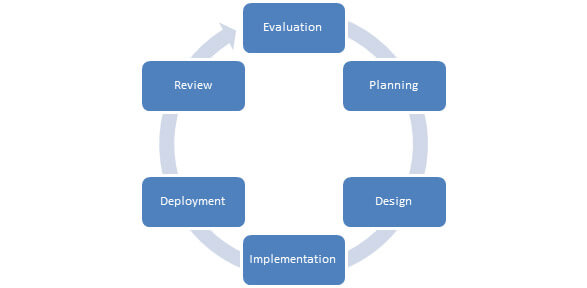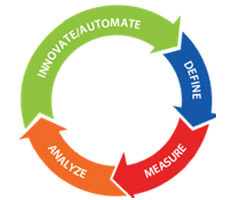What is Your Test Automation Strategy?
- NASA’s Mars Climate Orbiter.
- A server failure at LAX that turned off air traffic control’s radios and radar screens.
- A power blackout that darkened most of the eastern seaboard of North America for several days.

What do these three events have in common, besides being very public examples of technology failures?
They’re examples of situations that might have been avoided if more testing had
been done on the relevant systems.
Of course, that’s not to say that these situations were caused
by a singular issue, but could be rather a cascading effect of a number of
issues or the workflow/scenario encountered. However, adequate testing of the
systems prior to installation or use might have caught a few of the issues that
eventually contributed to these events. Read more about Application testing services.
We’re connected
even more today
While those events were serious, they happened a number of years
ago, when the world wasn’t quite as connected as it is today. The business
world has taken advantage of this connectedness and we’re able to do things so
much faster than before.
You can attend conference calls on your mobile phone from the
airport waiting lounge, implement a cloud solution for your company while you
wait for your order in a restaurant, or even chat with an astronaut on the
International Space Station. It’s exciting stuff but also mind boggling from
quality assurance perspective to get it right first time
Can business keep
up with that pace?
Business is struggling to keep up, and software development is no stranger to this struggle. Companies are relying more and more on
automated tools to help them with everything from managing code to handling
their QA testing. In fact, it’s become a critical and strategic necessity to
use test automation for many companies, as overall development times are
shrinking. Customer experience cannot be compromised, quality cannot be risked
and hence a robust Test Automation Strategy is most essential to today’s agile
enterprises.
Get your strategy
in place
A clearly defined automated test
strategy will help your
business keep pace with your market, and hopefully help you avoid any major
technology failures. These six phases of planning will allow you to develop a
robust testing framework that you can use right away: Evaluation, Planning,
Design, Implementation, Deployment and Review.

· Evaluation: Identify and select a tool that is best for your organization
based on the cost, technology used, and the extent of automation coverage.
· Planning: Laying out your entire plan and strategy helps you avoid any
issues going forward, as well as gives you contingencies to help solve any
obstacles you may encounter. Good planning involves everything from defining a
practical return on investment (ROI), identifying all dependencies, using the
correct resources at the correct time, as well as outlining a realistic budget
to cover all the work.
· Design: Determine which tasks are manual and which ones can be
automated – identify the low hanging fruits, i.e. the test cases which will
reap the maximum ROI when automated. Ideally you’d like the majority of them to
be automated, as you’ll be able to cover more scenarios and perform more robust
tests of your system. But this should be a more longer term goal.
· Implementation: Start setting up all the tasks and tests
you’ve planned. Identify the processes and resources affected by the test
plans, and make changes as required. A good automation framework can help
significantly accelerate your implementation and eventually the maintenance
cycles.
· Deployment: Now you’re ready to start testing, and using all of the tasks
and plans you planned and designed.
· Review: This isn’t just about reviewing your test results either.
Review every facet of your project and testing strategy periodically to find
what’s working and what’s not – refine continuously. Maintaining and
continuously updating your automation scripts alongside the application changes
is the key to ensure longer term ROI. While each project is different, your
overall framework should work for all the testing scenarios in your business
and market.
The key to your
testing strategy
Many executives have the impression that they can simply
purchase a test automation tool, assign a resource or two to the test project,
and that’s it. However successful test automation involves careful planning,
disciplined execution, meticulous maintenance procedures, and dedicated
staff. Not to mention a patient management team that is ready to support the
testing team with money, time, and resources.
A successful
testing strategy can lead to big things
It’s true. A successful testing strategy and framework can
positively impact your business and organization in a number of ways.
· Provides more comprehensive testing. The most complex test automation tasks are
completed easily. And your products become more robust as a result.
· Promotes the re-use of critical components. This ultimately increases employee
productivity since the time they would have spent on manual tests is saved by
the re-use of the components. They can invest that time into other critical
areas of their work and business.
· Reduces maintenance costs. Changes and updates to your testing
methodology are done more easily. Because
you’ve taken the time to plan and design your solution, your employees adopt
these changes quickly and easily and have less maintenance work to do on the
automated test solution.
· Creates the testing standard for your
organization. Your strategy
will become the standard that’s used across the organization because it’s
complete and robust.
Partner with a
pioneer in Test Automation

Learn how to accelerate your automation strategy by working with
Jade Global. We’ve got more than 200,000 hours of testing experience with all
the best-in-class automated testing software solutions, from commercial tools
like HP–QTP and Silk Test, to open source tools like Selenium and SoapUI. Learn
more about QAStrategy Consulting Services.
Our customers have reduced their manual testing efforts by over
90%, and improved their time to market by 30%. The test automation experts at
Jade Global can help you evaluate your tool options, develop Proof of Concepts
for you, and provide realistic ROI assessments for your business.
Original Blog Source: https://www.jadeglobal.com/blog/test-automation-strategy
Comments
Post a Comment